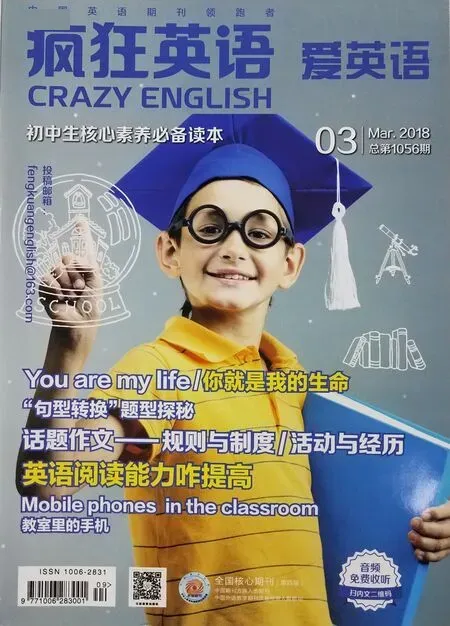❶Mobile phones in the classroom
by Emily/陈望珍(译)
□语篇导读
在大街上我们总能看到一些低头玩手机的人,目前对手机存有依赖的人群几乎覆盖所有年龄段。许多学生都将手机带入校园,甚至在课堂上使用手机。对于部分学生来说,手机不再是工具而是一种玩具。学生在课堂上使用手机的弊远远大于利,具体情况如何呢?让我们一起读读下文。
There is a piece of bad news for students who like to use their mobile phones when they study.A new research shows that students do not learn very well when they are texting and checking their social media accounts in class.The research is called,“Mobile Phones in the Classroom:Examining the Effects of Texting,Twitter,and Message on Student Learning”.Researchers watched 145 American university students in the classroom.Some of the students used their mobile phones during class,while the others had their phones turned off.The head researcher,Dr.Jeffrey,said while the teacher was talking,students who did not use their mobile phones got higher scores on tests they took at the end of the class.
Dr.Jeffrey said that for a teacher,one of the biggest challenges in class is to keep students studying all the time.He said,many students felt they needed to be online and check messages even if they had important work to do in class.
The researchers said it was very common for students to be physically present in class,but mentally absent because they were using their mobiles.Dr.Jeffrey said teachers were fighting a“losing battle”,because students were more interested in social media than learning.
The London School of Economics did a study in England and found that test scores increased by six percent after students didn’t use mobile phones in class.

◆词语积淀
1.text/tekst/vt.发短信
2.account/ə'kaʊnt/n.账户;解释;账目,账单
3.physically/'fɪzɪkli/adv.身体上;身体上地
4.economics/i:kə'nɒmɪks/n.经济学;国家的经济状况
5.mentally/'mentəli/adv. 精神上;智力上;心理上
6.losing battle必败之战
7.test scores考试分数;测试成绩
8....percent百分之……
◆典句赏析
1.There is a piece of bad news for students who like to use their mobile phones when they study.对于那些喜欢边学习边用手机的学生来说有一个坏消息。
(1)主句是there be句型,这类句型的谓语动词be的单复数形式应该与其相邻的主语保持一致。当相邻的主语是不可数名词或单数名词时,谓语动词用is/was;当相邻的主语是可数名词的复数形式时,谓语动词用are/were。
(2)该句是一个多重复合句,句子who like to use their mobile phones when they study是定语从句,修饰先行词students,关系代词who在从句中作主语;when在此处作为从属连词,在定语从句中引导时间状语从句when they study。
【即时尝试】哭的时候还在吃东西的孩子处于极大的危险中。
2.The head researcher,Dr.Jeffrey,said while the teacher was talking,students who did not use their mobile phones got higher scores on tests they took at the end of the class.首席研究员Jeffrey博士说,当老师讲课时,不使用手机的学生在课程结束后的检测中的得分更高。
(1)at the end of是固定短语,意为“在……结束时;在……末尾”,其后既可以接表示时间的词,也可以接表示地点的词。
(2)此句是多重复合句。宾语从句里含有时间状语从句,而时间状语从句里又含有两个定语从句。while及其后的部分是宾语从句;while the teacher was talking是时间状语从句;who did not use their mobile phones是定语从句,修饰先行词students;they took也是定语从句,修饰先行词tests。
【即时尝试】他说当父母不在家时,严格要求自己的孩子拥有更好的未来。
(答案见63页)
译文助读
对于那些喜欢边学习边用手机的学生来说有一个坏消息。一项新的研究显示,课堂上,一边发短信和查看社交帐号的学生,他们的学习成绩不好。这项研究被叫作“教室里的手机:检测短信、推特和信息对学生学习的影响”。研究人员调查了145名美国大学生在课堂上的表现。一些学生在上课期间使用手机,而其他的学生上课时将手机关机。首席研究员Jeffrey博士说,当老师讲课时,不使用手机的学生在课程结束后的检测中的得分更高。
Jeffrey博士说,对老师来说,课堂上的最大挑战之一就是让学生一直处于学习状态。他说,许多学生觉得他们需要上网看信息,即使他们在课堂上有重要的工作要做。
研究人员说由于使用手机,学生身在课堂心不在焉的状态非常普遍。Jeffrey博士说老师们正在进行一场毫无成功希望的斗争,因为学生们对社交媒体比对学习更感兴趣。
伦敦经济学院在英格兰进行了一项调查,发现学生在课堂上不使用手机以后,(学生们)考试的分数提高了6%。

